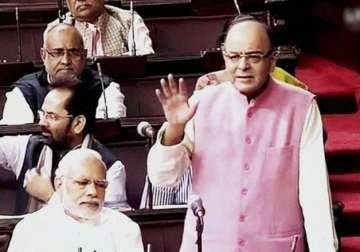GST Bill: All you need to know
New Delhi: Goods and services Tax is an indirect tax levied when a person buys a good or service. It will be levied on manufacture, sale and consumption of goods and services across India.GST was

New Delhi: Goods and services Tax is an indirect tax levied when a person buys a good or service. It will be levied on manufacture, sale and consumption of goods and services across India.
GST was introduced in Lok Saba in 2009 by UPA govt but they failed to get it passed. The NDA government introduced a “slightly modified” version of the GST Bill in Lok Sabha last December. It was cleared on May 6, but for GST to become a reality, the Bill must be cleared by two-thirds majority by both Houses, and ratified by 50% of states.
Through GST, government aims to create a single comprehensive tax structure that will subsume all the other smaller indirect taxes on consumption like service tax, etc.
Touted to be a major game changer, in the words of finance minister Arun Jaitley it will lead to the financial integration of India.
There will be a GST council which will include union as well as state ministers dealing with finances, while a dispute redressal committee will ensure swift solution to problems among ministers.
The Bill inserts a ne Article in the constitution to make legislation on the taxation of goods and services a concurrent power of the centre and states.
Why is it needed?
As far as the the constitutional status of GST is concerned, then currently, states don't have the power to levy service tax, while the Centre does not have the power to levy tax beyond the factory gate, i.e. VAT, sales tax, etc. To facilitate this, a constitutional amendment is required
GST will break the complicated structure of separate central and state taxes which often overlap with each other, to create a uniform taxation system which will be applicable across the country.
Taxes will be implemented more effectively since a network of indirect taxes like excise duty, service tax, central sales tax, value added tax (VAT) and octroi will be replaced by one single tax.
The state will still have a say in taxation, as the number of taxes will be reduced to three with Central GST, State GST and Integrated GST for inter-state dealings.
What does the opposition wants
The key reason for the bill being stalled is that the Congress has demanded reforms and alleged their concerns are being overlooked
The Congress wants a provision capping the GST rate at 18 per cent to be added to the Bill itself.
It also wants to scrap the proposed 1 per cent additional levy (over and above the GST) for manufacturing states.
This levy was demanded by manufacturing states who argued that they needed to be compensated for the investment they had made in improving their manufacturing capabilities. The Centre had agreed to this demand to encourage the states to support the GST Bill.
One of the problems of GST is that state administrations fear a loss due to it, but that will be taken care of with compensation packages against revenue losses to states for three years. Also, many states do not want to give up their fiscal autonomy.
Another concern is inclusion of petroleum products in the GST as for now states will continue to collect VAT and sales tax for the same. Punjab and Haryana were reluctant to give up purchase tax, Maharashtra was unwilling to give up octroi, and all states wanted to keep petroleum and alcohol out of the ambit of GST. BJP-ruled states like Madhya Pradesh and Gujarat took hard positions too
Benefits:
Currently, tax rates differ from state to state. GST Bill will ensure a comprehensive tax base with minimum exemptions - will help industry, which will be able to reap benefits of common procedures and claim credit for taxes paid.
Although the tax will bring down tax rates, the collection of taxes will increase thanks to the larger area covered by GST.
GST Bill passage is expected to reduce the cost for consumers with Finance Minister Arun Jaitley estimating GST will help increase India's GDP by around 2 per centParliament can decide on compensating the states for up to five years if state incur losses by implementation of GST.